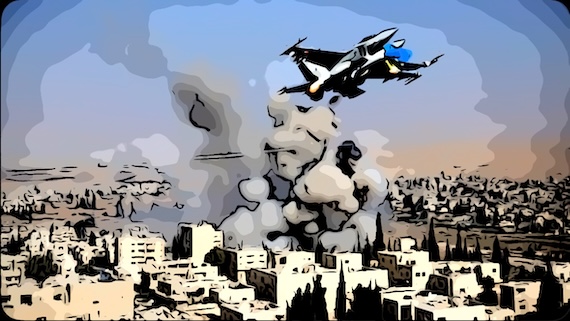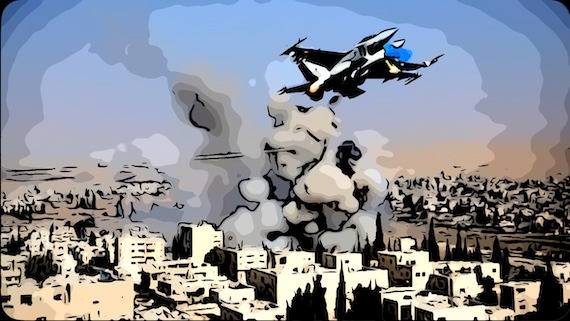( Middle East Monitor ) Israel’s aggressive operations against Syria continue by air and on the ground, imposing new realities at a time Syria’s leadership is preoccupied with internal affairs. This suggests that Israel’s approach to Syria goes beyond mere military strikes but rather aims at reshaping the Middle East, as it had announced at the onset of its aggression against Gaza in October 2023.
The ongoing Israeli attacks on Syria serve several objectives, primarily the redrawing of borders and maintaining military presence in areas Israel has invaded since the fall of Al-Assad. Israel is also working to establish understandings with Washington regarding its incursions into Syrian territory, as part of discussions about the future of foreign presence in the country.
Another key objective is Israel’s effort to learn from its failure to prevent Hamas’ cross border incursion on 7 October and to ensure that such a scenario does not repeat itself on the Syrian front. This includes preventing Syria from becoming a forward base for forces hostile to Israel by targeting the remnants of the Syrian army’s combat capabilities, ending arms smuggling from Syria to Lebanon, and countering Turkiye’s growing influence in Syria. Turkiye, Israel’s biggest and most significant regional adversary, consistently condemns Israeli aggression and warns against potential confrontations, as Ankara increasingly sees Syria as its strategic backyard.
Israel’s latest involvement in Syria came in the form of a military threat under the pretext of “protecting the Druze in Jaramana,” southeast of Damascus. This move reflects Israeli concerns about Syria’s new leadership, which it claims consists of Islamist elements hostile to Israel. Given the current uncertainty, threats along Israel’s northern borders are becoming more pronounced.
Recent Israeli actions towards Syria clearly indicate ambitions to control strategic areas. While this is still in its early stages and direct clashes with Syrian forces have yet to occur, such confrontations could become inevitable, with Israel preparing for a military operation on Syrian soil.
Israel’s increasing involvement in Syria marks a new chapter in the regional power struggle. While Turkiye seeks to secure its borders, treating Syria as a backyard of its national security, Israel is expanding its influence beyond its borders under the pretence of concerns over armed Islamist groups. This makes its latest claim of protecting Syria’s Druze population a significant milestone in the escalating Israeli-Turkish rivalry over Syria, particularly after Iran was sidelined from the conflict following Assad’s downfall.
One of Israel’s most alarming scenarios—one that seems increasingly plausible—is the presence of Turkish military forces inside Syria. This, in Israel’s view, would be a “disaster”, prompting its pre-emptive occupation of buffer zones, the peak of Mount Hermon, and an expansion of its control into Syrian territory, alongside demands for the complete disarmament of southern Syria, particularly in Quneitra, Daraa and Suwayda.
A noteworthy Israeli revelation involves the military secretary to the prime minister being sent to Moscow to request that Russia not hastily withdraw from its bases in Syria, as Israel reportedly prefers a Russian presence over a Turkish influence.
Israel’s aggressive actions against Syria stem from conflicting attitudes toward the recent developments in its northern neighbour. While many Israelis initially viewed Assad’s fall as a victory for Tel Aviv — weakening Hezbollah in Lebanon, striking Hamas in Gaza, and reducing Iranian influence — Israeli assessments quickly shifted. The new Syrian regime is now seen as an enemy, and Israel fears its new rulers.

The swift overthrow of Al-Assad and his regime by the Syrian opposition in just a few days triggered considerable anxiety in Tel Aviv. This led to large-scale pre-emptive strikes that, within three days, destroyed what remained of Syria’s air and naval military capabilities, as well as key military research centres. Israel justified these attacks as efforts to eliminate Assad’s hidden stockpiles of chemical weapons. Additionally, Israel occupied significant areas of the Golan Heights and declared the 1974 Disengagement Agreement null, effectively signalling a de facto declaration of war on the new Syria.
Israeli officials are openly concerned about the ideological similarities between the new Islamist political forces in Syria and Hamas. Though Syria’s new leader, Ahmad Al-Sharaa ‘Al-Jolani’, comes from a more radical Salafi-jihadist background than Hamas, Israel’s experience with the movement has been a harsh lesson.
While Assad’s fall has raised Israeli fears of further instability along its northern border, Israel also sees it as an opportunity to reshape regional dynamics. However, the prospect of anti-Israel forces consolidating power in Syria remains a significant concern, making the situation even more complex.
The views expressed in this article belong to the author and do not necessarily reflect the editorial policy of Middle East Monitor or Informed Comment.
 Unless otherwise stated in the article above, this work by Middle East Monitor is licensed under a Creative Commons Attribution-NonCommercial-ShareAlike 4.0 International License.
Unless otherwise stated in the article above, this work by Middle East Monitor is licensed under a Creative Commons Attribution-NonCommercial-ShareAlike 4.0 International License.


 © 2026 All Rights Reserved
© 2026 All Rights Reserved